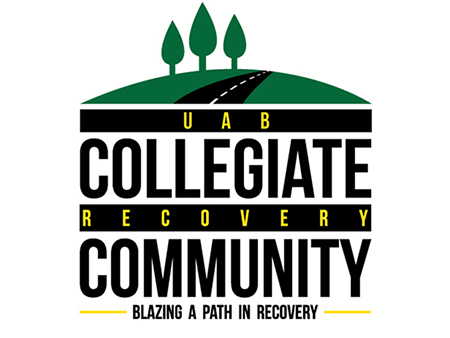 Addiction does not disappear because of a global pandemic.
Addiction does not disappear because of a global pandemic.
Quarantine and isolation can be even more difficult for people in recovery for substance use disorder. Drug overdose deaths are back up, after dipping in 2019 for the first time in a decade. Staff in the University of Alabama at Birmingham’s Collegiate Recovery Community are working to ensure students are supported, and also offer help to anyone in need.
Recovery is about connection — human connection to other people in recovery — and that is a really important support system, says Kristina Canfield, M.Ed., UAB CRC substance abuse prevention and recovery coordinator.
“So when everything happened and we all sort of went into quarantine — not just the CRC but the entire recovery community, really, around the world,” Canfield said, “we had to figure out ‘how do we continue to have this vital connection to each other when we can’t meet face-to-face now?’ That intimacy is so important in the recovery process. And so really it was about rising to meet the challenges of supporting our students and our recovery community and trying to fill that void.”
The Collegiate Recovery Community at UAB promotes and advances students’ personal, academic and professional achievement in pursuit of long-term recovery from addictions and co-occurring mental health disorders, health and well-being, and productive engagement in society.
In March, the CRC was able to “immediately” flip all of its recovery meetings on to a virtual platform, says Benton Crane, CRC assistant program coordinator. The weekly CRC Open Recovery meeting is at 7 p.m. every Tuesday; but the CRC also hosts an Open AA meeting at 5:30 p.m. each Tuesday and Thursday, an open LGBT NA meeting at 7:30 p.m. each Wednesday, and a Down with Disease NA meeting at 7 p.m. each Thursday. The Zoom Meeting ID is 869-456-6003. For the meeting password, check the CRC Facebook page or contact Canfield at kmc211@uab.edu.
| Canfield says one thing she has truly tried to communicate to students is that “we don’t have to isolate in isolation. We are still here, and we are still here to help. Even though we are isolated physically from each other, we don’t need to be isolated emotionally from each other.” |
Crane says they asked themselves, “How can we carry that sense of connection and community into a virtual space?” They also sought to emulate their past monthly socials, when, outside of meetings, they would enjoy fun group activities such as bowling, laser tag and communal family dinner night. They have enjoyed a card game night via Zoom, Netflix watch parties and trivia nights.
“It has been a huge learning experience for all of us, I think; but I feel like we’ve really been able to still connect and engage with students, help students feel supported, even though it is through a screen,” Crane said.
CRC celebrated its spring graduates with a virtual Zoom ceremony. The four graduating CRC members wore their caps and gowns, invited their friends and families, and got the chance to speak about their recovery and what CRC has meant to them. A similar ceremony will be held for a graduate in the fall. The CRC traditionally has a welcome-back social the first Tuesday after school starts, and is exploring an idea to send a food delivery on Aug. 25 to each member so they can eat together at home. Donors to CRC make events like that one possible.
The pandemic and the resulting “societal-level trauma,” from the effects of people being isolated at home to losing their employment and support systems, includes increasing rates of drug overdoses and drug overdose deaths, Canfield says. Last year saw a dip in drug overdose deaths for the first time in a decade, and “we were all very excited in the recovery advocacy world.”
“And kind of on the coattails of COVID, what we’ve seen is that really tick back up, if you compare March-July of 2020 to March-July of 2019,” Canfield said. “I heard someone call it ‘interlocking pandemics.’ We have COVID, and then we also have the mental health pandemic, which addiction is part of. So they are exacerbating each other.”
| All CRC, AA, and NA meetings from Wellness Promotion are listed in the Campus Calendar. |
Office hours for CRC are held on Zoom every Monday from 11 am.-1 p.m. Canfield and Crane say they are available to talk or text, and when school starts, they will have in-person hours if people would like to meet to talk on campus; recovery meetings will remain virtual.
Canfield says one thing she has truly tried to communicate to their students is that “we don’t have to isolate in isolation. We are still here, and we are still here to help.”
“Even though we are isolated physically from each other, we don’t need to be isolated emotionally from each other,” Canfield said. “Though a computer screen is not the same, it’s better than just being isolated and alone. And I am hearing that a lot from people; I am hearing that a lot from our students, even though they are kind of burned out on Zoom. Having some level of connection is better than nothing.”
